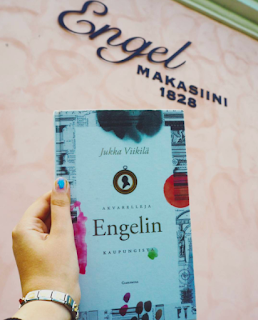'Do you always focus on what you're giving up, rather than what you'll be gaining? Some things are worth pursuit regardless of the cost.'
This book came out earlier this year and became a huge thing pretty much immediately and was translated to 25 languages quicker than a heartbeat. So naturally when I saw it at the library, it felt like I should and I would read it no matter what.
This book has two sisters, Scarlett and Donatella (or just Tella), leave their home island and their cruel father for a magical game called Caraval. Tella, the adventurous and excited one, believes this could be their way out, but Scarlett believes her arranged marriage to a stranger will get her and her sister away from their father.
Caraval is a game Scarlett has heard many stories of, and in which you can't trust anything you hear. It's hosted by a man called Legend, who supposedly plays each game wearing a different face. You can't trust anything you hear in Caraval, and Scarlett has to wonder if the sailor who brought her there has ulterior motives too. And then things go from bad to worse when Tella gets kidnapped and whoever finds her will win the game... and a wish.
Scarlett was fairly likeable to me, and even though I wanted to slap some sense into her a couple of times, she still felt relatable. Same goes for Tella, even though the two of them were fairly night and day as far as sisters go. The side characters were okay but most of them would have been better if they had gotten more time and development.
'She wrapped her arms around Scarlett like only a sister can. Fiercely like a kitten that has just gotten its claws and wants to rip the whole world to shreds so that everything would turn out alright.'
The plot was surprisingly interesting and full of twists, and it gave me many wow moments throughout the story. I was impressed with that, because I thought beforehand that the plot would be where this book was going to trip itself up; becoming a dull copy of every
other story like this. Turns out that wasn't actually the problem.
My knee-jerk reaction was to give this a full five stars, but today I've given it another thought and am starting to get annoyed with the general lack of worldbuilding (how gorgeous this would have been in a properly built world) and the few cop-outs it goes through instead of properly defining its own rules. It's actually something to say about how interesting the plot was that I ended up giving it four stars. Quite excited for the sequel, too. I'd be so happy if it expanded on the world of this, but I bet it'll be all too easy to just stick to the same formula as this book, since it's been so popular. Apparently we no longer care for worldbuilding in our 'high fantasy' books. Some of the plot twists towards the end also felt unpolished and weak, as if the author could no longer be bothered to write them out in full.
Also, there's a really odd thing where Scarlett sees emotions and colours, and it felt... weird. It didn't really fit in the tone of the book, and it wasn't explained until it had already been happening for some time. It didn't really add anything to this book, in my opinion.
Regardless, I enjoyed Caraval a lot and I'll be reading this series probably until the bitter end. The second book, coming out in 2018, is still untitled. (I hope it comes out sooooonnnn!)
For the Helmet 2017 reading challenge I put this in category 49: A new book of 2017!






